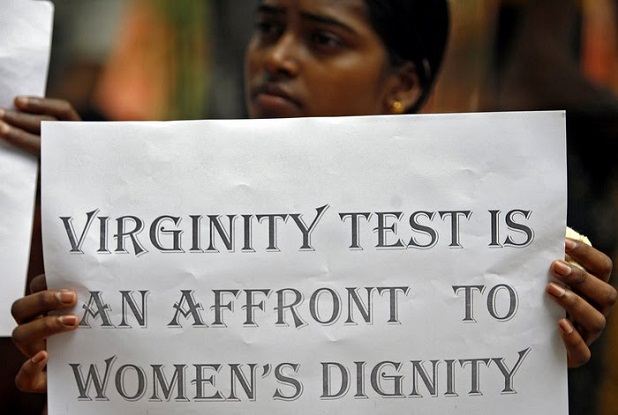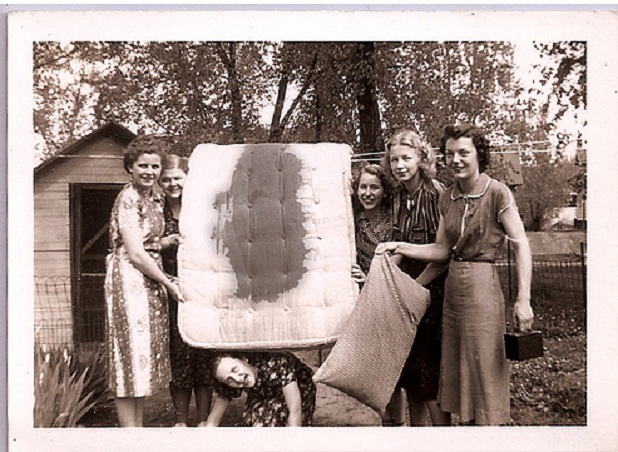The Unveiled Truth: The virginity myth
New in Ceasefire, The Unveiled Truth - Posted on Wednesday, October 13, 2010 21:14 - 8 Comments

By Shirin Sadeghi
Making my way through 26th street, just past 6th avenue in New York City this year, I ran into a used bookstore called Revolution. It recalled a similar, revolutionary-themed bookstore I’d been to a few times around Tottenham Court Road in London.
I inspected the shop, helmed at the time by an older man whose front teeth were generously arranged with an empty gum space for each tooth still standing. He wanted to chat, in a friendly way, about politics, but I’ve never been one to seek conversions in public places, so I politely changed the mood by heading toward the back of the store.
I do admire the collections in these politically-inclined stores – they cover Black History, people’s representations of their own experienced history (rather than someone else’s view on that history), minority issues, women’s issues and international politics from alternative angles (meaning not necessarily radical but simply not available in mainstream information portals).
What I found unique in this store — and maybe it’s because I haven’t been to one of these bookstores in awhile or maybe it’s a new vein of research on the fundamental shortcomings of upholding inherent rights worldwide — was the section on virginity. A table was laden with a number of books on the subject from varying perspectives but veering toward the same conclusion: that a woman’s virginity is realistically a non-issue (and actually impossible to prove) but politically a powerful tool of containing women’s independence and dominating a woman’s ability to explore herself and her world.
More interestingly, while it is a well-known fact that more traditional cultures place greater value on female virginity, those cultures that are less so do not differ quite as much as one would think. In Egypt versus England, a woman’s virginity is still a matter of consequence, just in a different way: in Egypt a known non-virgin will have more trouble being accepted by a potential groom’s family. In England, a woman’s “number” and the chastity or wholesomeness of her appearance is too often of some importance to a possible marriage. And in both “Eastern” and “Western” cultures, there are long histories of veiling and cloistering women, always under the guise of religion.
The subject of virginity struck a chord with me because over the last few years I have attended several weddings in which the virginity of the bride – never the groom – was of varying importance to the success of the proceedings. In the most extreme example I saw, for a wedding in South Asia, the groom and bride’s family had completely arranged the marriage and had mutually agreed on just a few chaperoned cafe meetings prior to the wedding. The groom was known to have lived abroad. The bride had never left her family home.
In a Middle Eastern wedding, also arranged, the bride lived abroad and the groom lived with his parents. This time, the families were more liberal and allowed the two to spend time alone for a few weeks ahead of the agreement to marry. Not willing to take the risk of losing this mate, the bride had convinced the groom, who she started sleeping with a few days after meeting him for the first time, that he was the unique and everlasting taker of her virginity. We’ll never know if he would have married her if he had known the truth.
What was perhaps most fascinating about the histories of virginity which I read was that book after book debunked the commonly accepted myth that it is actually medically possible to determine virginity. The truth is that the only certain way to determine a woman’s virginity – and it is always a woman’s virginity that is attempting to be proven – is to ask her yourself. But this method is not normally accepted worldwide.
Until quite recently, female virginity was a major taboo in the West.
Further, there is no certain understanding of what it means, exactly, to lose one’s virginity – is one still a virgin if she held hands with another? If she looked into the eyes of another? If she did everything except have intercourse with another? The definition does vary in different cultures.
And what of cloistered religious figures – are they still virgins if they have tactile relations with each other? What if they forget to avert their eyes from those of a man (or even women) in their presence? What if they develop an emotional relationship with another?
There is also the matter of a woman’s hymen not remaining intact, despite never having had vaginal intercourse. Perhaps you are from a culture where it is not acceptable for a woman to ride a bike. The superstition is that bike riding tears the hymen, which it does in many women, but so do a number of other mundane activities such as wearing pants or taking a walk, or simply sitting down. The structure of hymens differs in each woman and thus has a spectrum of durability.
The hymen itself, in fact, is not unique to humans – a number of other species, including whales, have a hymen. But studies have indicated that a female whale with an intact hymen is not more successful in maintaining a relationship, or even mating, than one whose hymen is not intact. The same can be said for humans.
Ultimately, virginity itself is a myth, a social construction for controlling and judging women. But until the world – men and women included – learns and accepts this, the detrimental politicization of female sexuality will continue and the happiness and self-actualization of both women and men will suffer because of it.
 Shirin Sadeghi is an Iranian-American writer and Middle East Consultant. She is a regular contributor to the Huffington Post and has previously worked as a Producer and Reporter for the BBC and Al Jazeera Television.
Shirin Sadeghi is an Iranian-American writer and Middle East Consultant. She is a regular contributor to the Huffington Post and has previously worked as a Producer and Reporter for the BBC and Al Jazeera Television.
Her weekly column, ‘The Unveiled Truth’, appears every Wednesday.
8 Comments
Sex in the news « conversations on sex and faith
cool
wow, i never even thought about it like that before, we still have a looong way to go for women’s equality
The Unveiled Truth: The virginity myth | MahMag World Literature
[…] for Ceasefire Magazine […]
Pearl
Great article, thanks Shirin for the topic.
anon
The obvious reasons are not to maintain a better relationship. Men don’t want to feel judged against past encounters. Women are incredibly cruel on this front.
[…] ShirinSadeghi’stakeonvirginity in Ceasefire Magazine summarizes the scholarly opinion on the subject (or at least, what people managing to get books published in the topic think): […]
You’re Not a Virgin (Probably) | We Got So Far To Go
[…] not the first person to criticize the concept of virginity (oh hell am I not). It’s fairly well established in most feminist circles that the concept of […]
anon2
If a woman is judgmental, and you’re familiar with the role of teaching, then teach her to be kind and decent, not limit her freedom in sexuality. In that case, the blame would be on her manner as a person, not on her gender’s stereotype that’s been used to unfairly restrict her lifestyle before marriage.



[…] Shirin Sadeghi talks about the myth of female virginity. […]